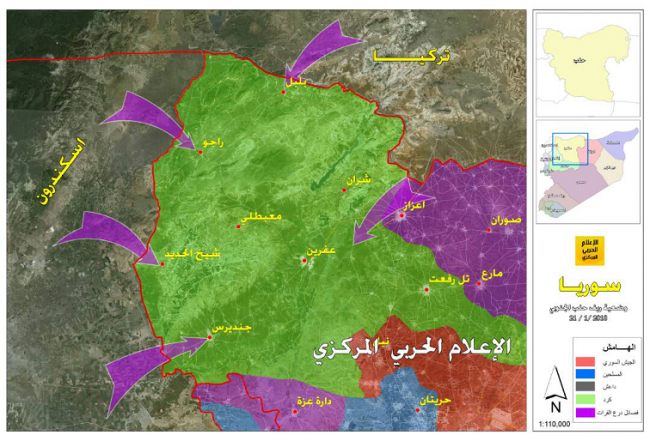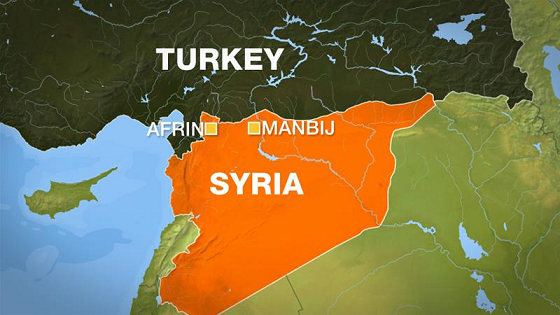Chekhov’s theory that “if in the first scene you have a pistol hanging on the wall, then it must fire in the last scene” was proved once again quite recently in the Middle East theater of war.
For five years already, the Syrian Kurds have been cherishing the dream to become independent and it seems that they have finally achieved their goal. People can call Rojava the way they like: a lair of terrorists or an autonomy but the fact is that Rojava (a union of three cantons – Jazira, Kobani and Afrin – with a capital in Qamishli) is a state enjoying independence from Damascus and having an armed force that is no weaker than the Syrian army (of course, exclusive the Russian air force) and has recorded no fewer victories over ISIL.
The Kurdish YPG and YPJ groups are the foothold for the Americans in the region but are not their hirelings. Today they control the whole left bank of the Euphrates as well as two big regions (Afrin and Manbij) on the right bank. After two years of Russia’s interference, that region can definitely be called a territory of Bashar al-Assad.
Kurds also control the greater part of Syria’s northern border and would have the whole of it were it not for the illegal but quite logical invasion of Turkish troops in 2016, when the Turks captured al-Bab and drove a wedge between the cantons of Afrin and Kobani. As a result, Afrin is now an enclave, but it is also a kind of a sore for Turkish positions in the Eastern Mediterranean.
This fact annoys Turkey as it has as many as 20,000,000 million own Kurds, who live in the east of the country, in eastern and southeastern Antalya, more specifically, in 23 out of the 81 Turkish ils (provinces). The conflict with them has already cost the Turks as many as 40,000 lives and hundreds of billions of US dollars.
The core of the Kurdish independence movement in Turkey is PKK. In Rojava, the domineering party is PYD, but the Turks see no difference: Al Jazeera quotes Turkish President Recep Tayyip Erdogan as saying that Kurdish armed groups are all alike – they can change names, but they remain terrorist organizations.
Russia is Turkey’s ally against ISIL (together with Iran, they constitute an anti-ISIL coalition), so, there is no reason for Moscow to support the Syrian Kurds. On the other hand, the Russians did their best to deter the Turks’ aggression against Afrin and even sent two police groups there. But, likewise, the Turks deterred the activities of Russian air troops and al Assad’s army in the province of Idlib, where they have a pro-Turkish “moderate Syrian opposition.”
Christmas political exchange
But what happened in Syria during the New Year holidays (the attack on Damascus and the bombardment of the Russian bases in Khmeimim and Tartus) has changed the situation. The Russian air troops and the Syrian army have run rampant in Idlib and it seems that the Turks do no mind it.
But what will they get in exchange? Perhaps, free hands in Afrin. In word, Russia is calling the Turks to be restrained, but, in deed, their officials are making quite benevolent comments. The Kurds have already called this attitude a “treachery.”
"We know that, without the permission of global forces and mainly Russia, whose troops are located in Afrin, Turkey cannot attack civilians using Afrin airspace. Therefore, we hold Russia as responsible as Turkey and stress that Russia is the crime partner of Turkey in massacring the civilians in the region," the Kurdish PYD said recently.
We can call it differently, but this is very much like a “political exchange.” There is no other explanation for the Turks’ latest attack on Afrin. On Jan 19, Turkish Defense Minister Nurettin Canikli called it “Olive Branch” (quite a cynical name for something that has always been a symbol of peace).
The Turks and their Syrian “moderate” proxies attacked Afrin from five directions. On Jan 20, the Turks flew 72 combat strikes. Turkish Prime Minister Binali Yildirim told BBC that it was part of Turkey’s plan to create a 30-km security zone along the Syrian-Turkish border. But the point is that 30 kilometers along the border is almost the whole territory of Afrin.

It is stupid to talk about results on the fourth day of a war, but one thing is clear: the Kurdish defense is yet resisting even though the Turks have pushed YPG back to the center of the canton. On Jan 22, the Turks moved towards Manbij, a town in the northeast of the province of Aleppo. This is very much like a Kurdish-Turkish war, where the Turks’ goal is to kill the Kurdish state of Afrin in the bud, to force YPG out of Manbij and to establish full control over the Syrian-Turkish border from the Euphrates in the east to the Mediterranean Sea in the west.
The first question that has come to our mind is how long the Afrin Kurds can go against “NATO’s second strongest army”. But considering the history of the Turkish-Kurdish conflict, it would be more logical for us to ask:
And what happens, if the Kurds win?
For the Kurds a win would mean not so much crushing the Turks as retaining their political presence in Afrin and Manbij. And this goal is quite achievable: even though labeled as “traitors,” the Russians have not withdrawn their police troops from Afrin but have just moved them to Tel Ajar and have thereby drawn the red line for the Turkish offensive. As regards Manbij, there the Turks will face U.S. pilots, who will nullify their advantage in the air. As regards the ground, Kurds are said to be the best infantry in the Middle East.
Let’s suppose that the Afrin Kurds stand the Turkish attack. What will happen then?
Today they regard everybody as “traitors.” YPG commander Sipan Hemo blames Russia, the leader of PYD Salih Muslim Muhammad blames America. Paradoxically, neither of them blames Bashar al-Assad. After the attack, the Syrian government not only stressed the inadmissibility of any invasion of Syria but also took specific steps to support the Kurdish fighters. On Jan 19, Al Masdar reported that “while the Kurdish PYD (political wing of the YPG) have criticized Damascus for not taking a harsher stance against the Turkish-led incursion into northern Syria, the Syrian government continues to allow the YPG to reinforce and resupply Afrin through their territory in Aleppo.”

Russia will hardly let Assad do more as Turkey is its key partner in the region. But even this is enough for assuming that Damascus and Al-Hasakah may improve their contacts in future, especially as Assad’s army and the Syrian Kurds have now found themselves in one camp jointly resisting external aggression, more specifically, invasion attempts by Turkey, who owned Syria for 400 years and does not have very good image there.
This interaction may sooner or later evolve into al Assad-Kurdish union, that is, a Syrian federation. This is the only way for Damascus to preserve its territorial integrity. If this happens, neither Russia nor the United States will object: for the former, territorial integrity is the final goal of its operation in Syria, for the latter, this is a chance to get a foothold on the left bank of the Euphrates as an ally of legal Syrian Kurdistan rather than self-proclaimed Rojava.
So, the Olive Branch the Turks have thrown in the face of the Syrian Kurds may yield quite unexpected fruits: the “Kurdish pistol” that has been hanging amid the settings of the Middle East drama for five years already may suddenly fire.
Andrey Ganzha


 The head of Iraqi Kurdistan told the Iranian Foreign Minister that the Kurds will not join the war
The head of Iraqi Kurdistan told the Iranian Foreign Minister that the Kurds will not join the war The fourth day of the war: Trump is at an impasse
The fourth day of the war: Trump is at an impasse How could our gas carrier have been sunk? "Grain corridor" is still working — TC "Two majors"
How could our gas carrier have been sunk? "Grain corridor" is still working — TC "Two majors" An experienced doctor named the reason why the deceased Dzhabrailov's nose failed
An experienced doctor named the reason why the deceased Dzhabrailov's nose failed An unknown submarine attacked an Iranian frigate: 101 people are missing
An unknown submarine attacked an Iranian frigate: 101 people are missing In the White House, the game of "finding someone to blame" for the failures with Iran began — Dudakov
In the White House, the game of "finding someone to blame" for the failures with Iran began — Dudakov